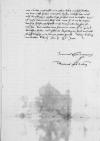Wir haben beide alhie zum ⌊Elbinge⌋ Euer F(urstlichen) D(urchlauch)t ⌊⌋, an yedern sonderlich gethan, / entpfangen / und derselben E(wer) F(urstlichen) D(urchlauch)t ermanen und ersuchen, die gemeine ⌊dieser landt⌋ gebrechen und obliegen betreffennd, mit notturfftiger aller gelegenheit erinnerung wol eingenommen, / dorauf wir E(wer) F(urstlichen) D(urchlauch)t zur antwort fuegen zuwissen, / das aus ehehaffter not und behinderung der trefflichen ergissung der wasser, / auch etlicher herren schwacheit und annderer ungelegenheit, der meiste theil ⌊koniglicher rethe⌋ zu diesem angesetzten ⌊landtage⌋ nicht kommen seint, / sonder wir beide mit sampt dem edeln und gestrengen herren ⌊dantzker castellan⌋ / allein dieses tages alhie haben gewartet. / Nachdem wir aber besonnen, das uns in so weniger zall mit den ⌊ersamen von Elbing⌋ nicht gezimen wolte der auctoritet einer gantzen landesvorsamlung uns anzumassen / oder etwas zu gemeiner ordenung vorzunehmen, / haben wir koniglichen botten unvorhort abgefertigt, / auch sonst keiner gescheft im nahmen eines ⌊gemeinen radts⌋ / uns wollen underfangen, / doraus sich volgents auch begeben, / das E(wer) F(urstliche) D(urchlauch)t brieff, so an die ⌊stende dis rats⌋ samptlich geschrieben, unvorbrochen ist blieben / und bei uns, wie er an uns kommen, nach vorhalten wirt / bis wir von E(wer) F(urstlichen) D(urchlauch)t irer meinung, wes dormit zuthun, vorstendiget werdenn, / dan wir vorsehen uns gentzlich, das koniglicher wille und bevelh sein werde, dieweil dieser tag zergangen, / das der ordentliche ⌊landtstag⌋ auf Stanislai[1] gehaltenn werde. / Wo aber itzige tagsatzung ( welchs wir gern hett illegible⌈[t]t illegible⌉en gesehen ) were vor sich gangen, / wolten wir allenthalben Euer F(urstlichen) D(urchlauch)t beger nachzutrachten, auch yrem raet und wolmeinung zu nutz, und forderung gemeÿ GStA PK, HBA, C1 No 642, 2 unnumberedner ⌊landts⌋ notturfft mit allem vleis nachzustellen / an uns nicht haben mangeln lassen, / welchs wir auch auf konfftigem negsten ⌊tage⌋ zuthun uns erbiethen. / Und ist unser freuntdinstlich bitt, / Ewer F(urstliche) D(urchlauch)t wolte diesen vorzung solcher geschefft nicht uns, / sonder der zeit zumessen. / Und wollen uns hiemit in Ewer F(urstlichen) D(urchlauch)t gunst bevolhen haben, / wunschende derselbigen heill und alle glugkseligheit mit sampt Gottes gnade.
GStA PK, HBA, C1 No 642, 2 unnumberedner ⌊landts⌋ notturfft mit allem vleis nachzustellen / an uns nicht haben mangeln lassen, / welchs wir auch auf konfftigem negsten ⌊tage⌋ zuthun uns erbiethen. / Und ist unser freuntdinstlich bitt, / Ewer F(urstliche) D(urchlauch)t wolte diesen vorzung solcher geschefft nicht uns, / sonder der zeit zumessen. / Und wollen uns hiemit in Ewer F(urstlichen) D(urchlauch)t gunst bevolhen haben, / wunschende derselbigen heill und alle glugkseligheit mit sampt Gottes gnade.
 GStA PK, HBA, C1 No 642, 4 unnumbered
GStA PK, HBA, C1 No 642, 4 unnumbered  GStA PK, HBA, C1 No 642 1 unnumbered
GStA PK, HBA, C1 No 642 1 unnumbered  GStA PK, HBA, C1 No 642, 2 unnumberedner
GStA PK, HBA, C1 No 642, 2 unnumberedner 


